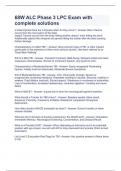68W ALC Phase 3 LPC Exam with complete solutions
In blast injuries there are 3 Impacts when do they occur? - Answer- Baro-Trauma occurs from the concussion of the blast.
Impact Trauma occurs from the body hitting another object / brain hitting the skull.
Additionally objects like shrapnel and gravel hitting the soldier after the blast causing further damage.
Characteristics of a Mild TBI? - Answer- Most common type of TBI, is often missed, particularly in the presence of other more obvious injuries. Has been referred to as "Dead Man Walking"
S/S of a Mild TBI - Answer- Transient Confusion (Bell Rung), Delayed verbal and motor responses, Disorientation. Slurred or incoherent speech, any period of LOC.
Characteristics of Moderate/Severe TBI - Answer- Easily recognized Penetrating injuries, Initially lucid but deteriorate, Moderate-Severe Symptoms.
S/S of Moderate/Severe TBI - Answer- LOC, Personality Change, Severe or progressively worsening headache, Repeated vomiting or nausea, Seizures, Inability to awaken, Pupil dilation one/both, Slurred speech, Weakness or numbness in extremities,
Loss of coordination, increased restlessness, confusion agitation, Vomiting and neuro deficit
What is MACE? - Answer- a good tool to form the neurological/cognitive baseline.
What should a Tracker for TBI's have? - Answer- Baseline results, Mace result, Exposure, Proximity, Frequency to Blasts, Retests for comparison throughout deployment.
How often should a MACE evaluation be done? - Answer- Every 6 months or when mission dictates.
What are the 5 domains of function examined in the MACE test? - Answer- Orientation, Immediate Memory, Neurological Screening, Concentration, and Delayed Recall.
What is a Pronator Drift? - Answer- When attempting to hold arms out in an extended position with eye closed, one arm will drift or drop downward and pronate (Palm turned downward)
List Level 2 Evacuation Red Flags for TBI - Answer- Any positive answer to Mace items V-VIII Double Vision, Worsening Headache, Worsening Headache or disoriented to place, LOC greater than 5 min, Slurred speech.
List Level 3 Evacuation Red Flags for TBI - Answer- Progressively declining levels of consciousness, Pupil Asymmetry, Seizures, Repeated vomiting.
When approaching the possibility of a TBI it is imperative to focus on what 3 areas of evaluation? - Answer- Cognitive, Physical, and Behavioral..
What Cognitive symptoms would you look for when evaluating a TBI? - Answer- Attention difficulties, concentration problems, memory problem, and orientation problems.
During a TBI evaluation what physical symptoms would you look for? - Answer- Headaches, dizziness, insomnia, fatigue, uneven gait, nausea, blurred vision, and seizures.
When evaluating a TBI patient what behavioral changes should you take note of? - Answer- Irritability, depression, anxiety, sleep disturbances, problems with emotional control, loss of initiative, and multiple personal problems.
TBI Airway treatment considerations? - Answer- Avoid hyperventilation unless there are signs of cerebral herniation, posturing with asymmetric or bilateral pupil dilation, SaO2 Greater than 90 for moderate and sever TBI, ensure definitive airway
What would you do for Pain management in a TBI casualty? - Answer- Tylenol, avoid opiates/ketamine. Giving no medication will give the neurosurgeon a clean canvas to work with.
What options do we have for brain targeted therapy in TBI patients? - Answer- Mannitol:
Use with signs of herniation (recommended only with the use of high fluid volume compensation for any ensuing fluid loss. 1.4-2.1 g/kg recommended dosage. Mannitol may exacerbate hypo tension, Hypertonic solution appears to reduce ICP when given as a Bolus. (Mannitol is an Osmotic Diuretic). Broad Spectrum Antibiotic for penetrating brain injury.
Triage and transport decisions for TBI? - Answer- GCS 14 or below should not RTD
Frequent exposure to blast may cause traumatic iridoplegia which could lead to fixed dilated pupils
Reassess GCS and pupils throughout evactuation.
What should we review daily? - Answer- SIGACT to identify who has been exposed to blasts or any other MOI's that may cause TBI.
What testing should we conduct post deployment? - Answer- Neurocognitive testing to compare with the pre-deployment results and notify PA of any abnormalities.




